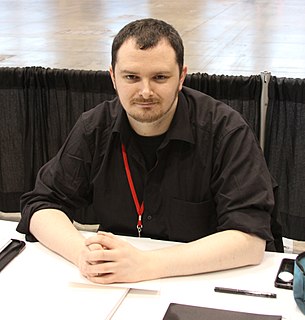A Quote by Milos Forman
When you make a film, you realize that the audience will be powerless to stop it or flip back to refresh their memories or skip the boring parts. They are at the mercy of your storytelling.
Related Quotes
You can't just skip the boring parts." "Of course I can skip the boring parts." "How do you know they're boring if you don't read them?" "I can tell." "Then you can't say you've read the whole play." "I think I can live a happy life, Meryl Lee, even if I don't read the boring parts of The Tragedy of Hamlet, Prince of Denmark." "Who knows?" she said. "Maybe you can't.
It is very linear storytelling, and I think that's not so much the fashion. I was watching a new drama the other night which was extremely non-linear, where you flash back and flash forward in ways that certainly keeps you on your toes as the audience. There's not much of that courage with the storytelling in our Maigret film.
Filmmakers need to realize that their job isn't done when they lock picture. We must see our films through. Studios no longer do this for a large percentage of films. The odds that your film will get a major campaign are dim these days. So you must find and nurture your own audience and make sure your film has a life.
That's the type of thing you need to keep in mind when drawing comics. The storytelling. Consider the action and the space available to you, that's what will make it a great comics page. Once you've figured that out, you can always find/make the reference to support your storytelling decisions. So by all means, study film, but as with any reference, the results are better when they inform the craft and not dictate it.
Your first film is always your best film, in a way. There's something about your first film that you never ever get back to, but you should always try. It's that slight sense of not knowing what you're doing, because the technical skills you learn - especially if you have a film that works, that has some kind of success - are beguiling. The temptation is to use them again, and they're not necessarily good storytelling techniques.
In comics the reader is in complete control of the experience. They can read it at their own pace, and if there's a piece of dialogue that seems to echo something a few pages back, they can flip back and check it out, whereas the audience for a film is being dragged through the experience at the speed of 24 frames per second.




































